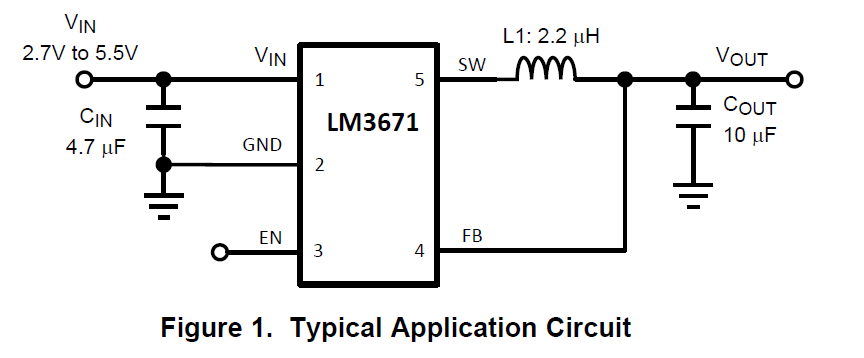The schematic is in the datasheet:
http://www.farnell.com/datasheets/1781731.pdfLM3671MF-1.5 has built in resistors to set the voltage and everything else that would be needed otherwise - it's factory set to 1.5v. So the circuit is really simple : one capacitor at the input and output, and one inductor. Easy.

Connect EN to input voltage to get the chip to run. Keep in mind that you need to use ceramic capacitors, not electrolytics. At the high frequency this regulator works, electrolytics are no good.
later edit: Oh yes.. the inductors matters, a lot. You can't pick any 2.2uH inductor. Read the datasheet, it gives tips regarding what to use and how to pick. Basically, the inductor needs to have a low resistance (less than 0.3 ohm) and other parameters. There's also a table on page 21 that recommends some inductors - you can check the specifications of those and find something with similar specifications if those in the table are no longer available.
For example something like these should work :
http://uk.farnell.com/murata/lqh43pn2r2m26l/inductor-power-2-2uh-20/dp/2219282 or
http://uk.farnell.com/bourns/cvh252009-2r2m/inductor-power-20-2-2uh/dp/2118124You can probably connect the input of the regulator it straight to the battery, the max1555 should have no problems charging the battery while this regulator takes out energy from the battery.
even later edit: In response to: Also "LM3671MF-1.5" is less efficient than "LTC3406ES5-1.5"?
It seems to be a bit less efficient than the one I mentioned, but it's really hard to say ... the efficiency will vary with the difference between the input and output voltage. Either way, the efficiency of both these chips can go to about 90-95%, while that mc34063 is really bad at around 65-70% efficiency. So no matter which one you use, they're both much better.